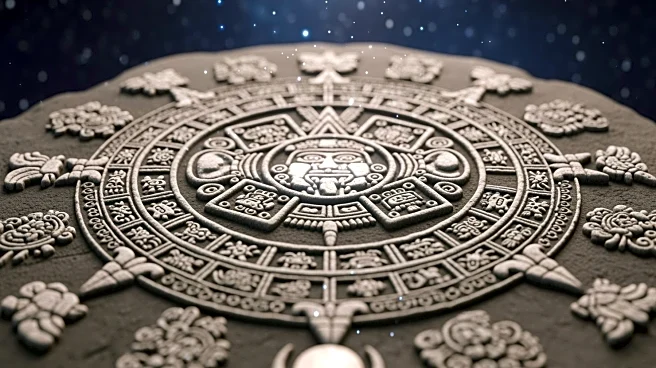What's Happening?
Researchers have uncovered the sophisticated methods used by the Maya civilization to predict solar eclipses, as detailed in the Dresden Codex, a medieval Maya text. This codex, dating back to the 11th
or 12th century, is one of the few surviving hieroglyphic Maya documents. It contains intricate calculations that allowed Maya calendar specialists, known as 'daykeepers,' to forecast eclipses with remarkable accuracy. The study, published in Science Advances, reveals that the Maya used a complex system to adjust their predictions, ensuring precision over centuries. This discovery sheds light on the advanced mathematical and astronomical knowledge possessed by the Maya.
Why It's Important?
The revelation of the Maya's eclipse prediction methods underscores the civilization's profound understanding of astronomy and mathematics. This knowledge was integral to their cultural and spiritual practices, influencing rituals and societal events. The study highlights the importance of preserving indigenous knowledge, which offers valuable insights into historical scientific achievements. Furthermore, the findings contribute to our understanding of ancient civilizations and their contributions to science, challenging the notion that advanced astronomical knowledge was exclusive to European cultures. This research may inspire further exploration of indigenous scientific methods, promoting a broader appreciation of diverse cultural heritage.
What's Next?
The study opens avenues for further research into Maya astronomical practices and their applications in modern science. Scholars may explore other aspects of the Dresden Codex to uncover additional insights into Maya knowledge systems. The findings could also encourage interdisciplinary collaborations between historians, archaeologists, and astronomers to deepen our understanding of ancient scientific achievements. Additionally, the study may prompt efforts to preserve and study other indigenous texts, potentially revealing more about the scientific capabilities of pre-Columbian civilizations.
Beyond the Headlines
The discovery of the Maya's eclipse prediction methods highlights the ethical importance of preserving and respecting indigenous knowledge. As modern science continues to evolve, integrating historical insights can enrich our understanding of the natural world. This research also emphasizes the need for cultural sensitivity in scientific exploration, recognizing the contributions of diverse civilizations. The study serves as a reminder of the interconnectedness of science and culture, encouraging a holistic approach to knowledge preservation and dissemination.









